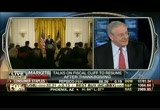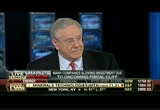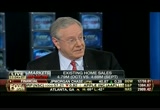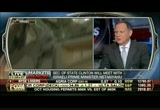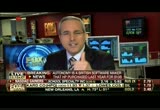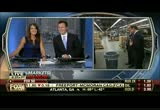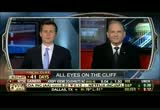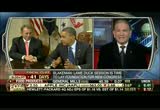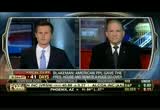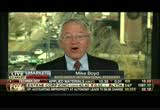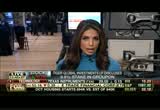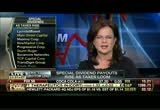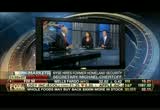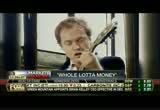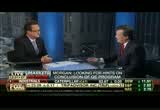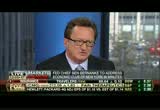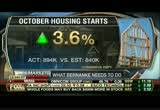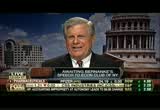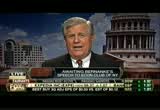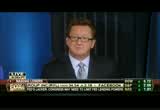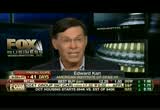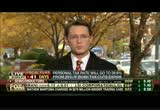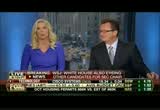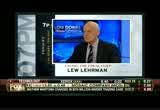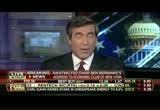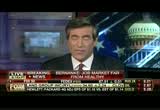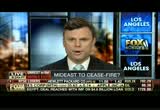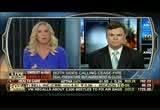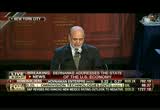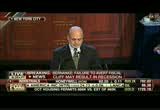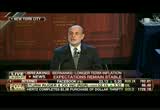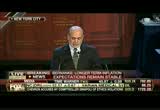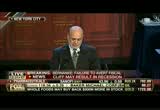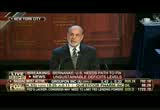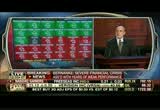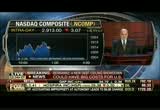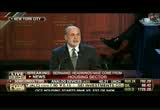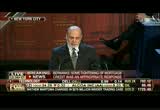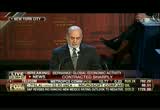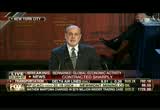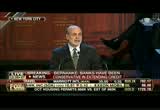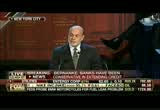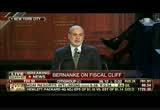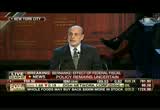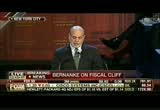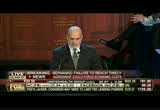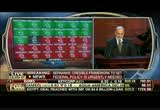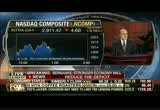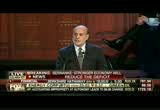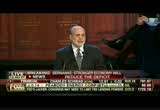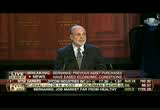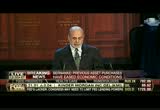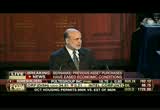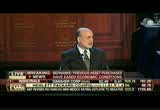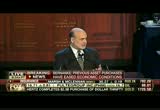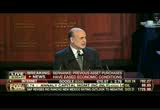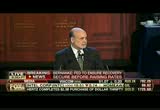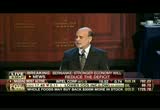tv Markets Now FOX Business November 20, 2012 11:00am-1:00pm EST
11:00 am
dagen: i am trained to think that all. connell: i am connell mcshane. dagen: secretary clinton heading to the middle east. connell: then there is the hewlett-packard story. trying to shuffle through a mess. the accounting fraud taking the stock way down as we speak. dagen: the markets are down. take a look at the dow. stocks now and every 15 minutes. nicole: we are seeing a day very different than yesterday. today giving a little bit back. down 32-point on the dow jones
11:01 am
industrials. you mentioned hewlett-packard. that is wang had negative down point itself. names like apple for example-virtually flat or leaning to the downside. connell: will get the numbers in the economy. dagen: steve forbes is from forbes media. >> i am always and often missed. europe is raising taxes, driving their economies into recession. japan is doing the same thing. we are about to do the same thing. the best thing that could happen is they kick the can down the
11:02 am
road and do nothing. postpone everything. put it off for six months so that they do something sensible. raising taxes on capital. raising taxes on small businesses. that just means how much damage will be done. that will slow the economy next year. dagen: this is interesting. most of the predictions have been, if we go over the fiscal cliff, then the odds of recession go way up. you are saying just the opposite. if we do not go over, if we come to a deal, we go to recession. >> just postpone it for six months. put it off so you make it something sensible done. we will see what the circumstances are. to raise taxes now will hurt. you combine that with what the fed is doing, this qe3, which will make it harder for small to
11:03 am
medium-size business to get credit. you put that together and that will guarantee a slowdown. dagen: and a lot of republicans are throwing in the towel on the tax increase on wealthier americans. they think it is inevitable. why fight it at this point. we heard it from bill kristol a couple of weeks ago. >> obama does not occupy the high moral ground alone. what they should do, but will not, you want clinton type of tax rate that we had back in the 1990s, okay, give us that clinton type of error. in return, we want spending levels proportion to the economy. repeal obamacare. republicans should go on offense instead of just letting the democrats define the terms of debate. dagen: do you think that all of the tax rate should go up? >> no. no. dagen: just for the wealthy, you are talking about.
11:04 am
>> i do not want any tax increases. critics will say: oh, you are just kicking the can down the road. fine, that will help save the economy. that things will happen. connell: just in terms of perspective, the economy and numbers we report every day, you could make an argument that things are getting a little bit better. the housing data is turning around. some people say time heals wounds. >> all the more reason not to hurt the economy. there are numerous new regulations coming under obamacare. that will hurt. you have numerous regulations
11:05 am
coming from dodd-frank. that will hurt. put them to the third degree. why in the world do you want to pile that on with new taxes? connell: do nothing. dagen: great to see you, steve. right now secretary of state hillary clinton is on her way to the middle east where she will try to help progress the deal to end the violence between hamas and israel. connell: we have the former ambassador of the united nations. are you optimistic that in the not so distant future that we will see some piece? >> well, i am optimistic. first of all, i am optimistic because i just came for the new york stock exchange where i rang the opening bell. today is israel today at the new york stock exchange. to see the israeli flag next to
11:06 am
the united states flag was very uplifting and very optimistic there'd i am optimistic that there will be an end to this. we are fighting a brutal organization that has been showering 14,000 rockets at israeli villages and schools and cities and kindergarten over the last seven years. over 10,000 rockets just in the last few days. indiscriminately wanting to kill civilians and especially aiming at schools and kindergarten. this has to stop. it has to stop with the knowledge and certainty that that snake will never raise its ugly head again. dagen: what can secretary clinton do or what needs to be done to avoid a ground invasion
11:07 am
by israel? >> i very much welcome secretary clinton's visit, but, i think as you said, one of the main policies has not been invited to this dinner and rightly so. i do not take we should talk to. i think what she should do is talk to the president of egypt. connell: i just want to throw in something that just crossed on the wires now. it is being reported that hamas official says they have agreed to and egyptian brokerage cease-fire. maybe something like that is getting done as we speak.
11:08 am
>> i know it is getting discussed as we speak. the terms have to be very clear. we have to reach a point where both the capability and will of hamas to ever try anything like that again is eliminated. egypt is a key player because it does want to regain the leadership of the world. we must remember that the battle for supremacy and leadership in the middle east and muzzle world today is between two countries that are not even arab. iran is the packing of hamas. if turkey and egypt prevail, this will not just be an achievement of bringing peace and quiet to our region, this will signal the fact that iran has been defeated. then, we can turn to the real
11:09 am
issue and real threat which is the iranian nuclear quest. dagen: thank you. you answered my question. it was great to see you. thank you very much. take care, ambassador. connell: we will have more about this breaking news as we continue. we also have more stories to get to. hewlett-packard taking the stock down. dagen: while you are down in turkey watching the parade this thursday, retailers will be loading of your e-mail box with so many offers. are they worth it? take a look at oil prices and how they are holding off today. somewhat lower. maybe some reaction to the news that connell was talking about. we will be following that and so much more straightahead. ♪ ♪
11:10 am
11:13 am
11:14 am
fraud, for lack of a better term. let's get straight to the comments. he is stunned and disappointed to learn of the problem. the du jour -- to diligence was particular. along with his former chief strategy officer and then of course mike lynch. hp first learned about this and what was presented to hp as they were purchasing autonomy after lynch stepped out and they ordered a accounting process.
11:15 am
they have now turned it over to the sec. they will not comment if also the department of justice is involved. making the rounds today saying that and this is a direct quote "indirection to -- they should have been held responsible and they are gone. "to solve all of the self, there are still serious questions about what went on with the do they cannot be held responsible for missing this problem. this leads to another question. the former ceo at hp, he was that oracle. autonomy was shocked to oracle. a press release from oracle saying that they said with the current market value of $6 billion economy was already extremely overpriced.
11:16 am
if they knew that, how did hp visit? dagen: thank you, adam. connell: a quarter past the hour. let's go back to nicole. nicole: best buy is a mess. you are seeing the stock. it is down about 13%. it is at a new ten-year low. they are having same-store sales that are dropping. the night declined and ten quarters. today they are down 27 points. some of which is attributed directly to hewlett-packard. connell: thank you. dagen: retailers keeping track of all of that inventory for the holidays with a lot of help. i am not talking about people.
11:17 am
11:21 am
>> at 20 minutes past the hour, i have your fox news minute. making this our a peace deal between israel and gaza militants. the cease-fire will take effect at midnight. that is 5:00 p.m. eastern. the deal was apparently brokered by egypt. president obama called egyptian president earlier today. feds charging for california man with plotting to kill americans overseas by joining al qaeda and the taliban in afghanistan. the fbi claiming that the failed terrorist were going to bomb government facilities and public
11:22 am
places. one of them served in the air force. warren goodman has died. the two-term republican from the granite state served from 1980 to 1993. he is perhaps best known for the balance budget plan passed in the 1980s. he was 82 years old. let's get you back now to dagen. dagen: we have breaking news to break to you on elmo. sesame workshop saying that the elbow actor has resigned calling this ongoing of sex allegations problem a distraction. kevin clash has resigned. allegations that he had sex with a minor. the man recanted his story and then reversed that recantation in recent days. kevin clash.
11:23 am
resigned. he is the man behind elmo. connell: let's go to some other headlines now. back to the retail world. 97% of retailers with an online presence planning special promotions for the thanksgiving weekend. that has gone up. cyber monday also a big deal. 72 million people expected to shop online on cyber monday. many retailers have a promotion plan. dagen: with the holiday retail badness just around the corner, there is one technology that is key for keeping track of all the inventory flying around. zebra technology headquarters out in new york. jeff: you thought the future was plastics. no, it is not plastic. this is what you use when you go to the store.
11:24 am
the person that checks you out. you do not even go to the checkout counter anymore. they do it portable. i have the ceo of zebra technology. >> i hope this will be a good christmas at zebra. jeff: you have had a choppy year, though. >> yes. north america has been the strongest of our market this year. jeff: it gives people what you call sort of intelligence where they can sort of see into the future. >> yes. it is all around how we help increase visibility into our customers operation. jeff: if you are trying to buy a dress and the macy's does not have the address you want, you can find it in another store.
11:25 am
>> how to improve the shopping experience and how to make it more efficient. jeff: growing from a company that used to do all the little pronounce tune out this brand-new technology. it is everywhere. when the police officer writes you a ticket, it prints out on one of these machines. in the hospital, they scan everything. dagen: it does not matter. jeff: she is a two, isn't she? connell: you started with six. you should have seen the look on
11:26 am
her face. jeff flock. the one and only. dagen: i should stifle this very moment. connell: people are watching lawmakers. they are looking for the debt problems. dagen: does it make you a winner or not? if you need some winners, here are some on the s&p today. ♪ can i help you? i heard you guys can ship ground for less than the ups store. that's right. i've learned the only way to get a holiday deal is to camp out.
11:27 am
11:29 am
ask if your heart is healthy enough for sex. do not take viagra if you take nitrates for chest pain; imay cause an unsafe drop in blood pressure. side effects include headache, flushing, upset stomach, and abnormal vision. to avoid long-term injury, seek immediate medical help for an erection lasting more than four hours. stop taking viagra and call your doctor right away if you experience a sudden decrease or loss in vision or hearing. this is the age of taking action. viagra. talk to your doctor.
11:30 am
dagen: the president out of the country, but lawmakers are surely hard at work on trying to solve our debt problems. ready to take off for the holidays, what to expect as you cram yourself into the airplane seat. the rush is on for dividend. country looking to pay out for the new year and new taxes. connell: bottom of the hour. let's go back to nicole petallides. 20 the new ceo brian kelly to the top post at green mountain coffee roaster. we are seeing the stock up nearly 7%.
11:31 am
they have moved to a four year high. the only thing, the one caveat to this number is building permits. going forward does not look as promising as what we have seen. we have seen homebuilders doing well. we have seen home depot, lowe's, all of those names have been doing well. lowe's is moving to a new high again. the housing recovery coupling with hurricane sandy. connell: thank you very much for that. so much for sex sells. 33% of americans following the fiscal cliff debate last week. it shows that the cliff be that the petraeus six scandal that even the situation we have been talking about with israel and gaza. you know, i should say before i
11:32 am
even asked you a question, there is another part of that where google search petraeus was the top. the idea that this fiscal cliff debate is important, how does that change or affect the dynamic in the negotiations could not the clock is ticking. people know this world play out in very short order. january 1 we have tax increases going into affect. basically, the status quo has been maintained. now it is up to the leaders we have now in this congress to set the stage for the next congress. all eyes are on the congress right now. they must do something. the clock is running out. connell: 41 days left. steve forbes was on earlier.
11:33 am
he wanted to give them more time and maybe come up with something better. it seems as if we are leaning towards trying to get a deal done. don't you think? even if you listen to boehner and harry reid, pelosi and the president, they are leaning towards getting something done. >> absolutely. i think something must be done. next quarter, we will be faced with the same old fable once again. it is one crisis after another. this was a self created crisis by republicans and autocrats. be careful what you wish for. the day of reckoning is here. connell: let's just take, as the premise of it, let's just say
11:34 am
they have too given for whatever whatever reason and say the taxes on the top 2%, the families making $250,000 above, that those are going up. what can they demand in return that they can get from the democrats? >> we need drastic spending reductions. we have to tackle the root cause of our problems which is entitlements. once and for all, we have to tackle entitlements. we can increase taxes without increasing the rates. we can talk about capital gains, the death tax. connell: by the way, why is that better for the normal person? they may be better off if the tax rate for the top people went up. i understand both may happen.
11:35 am
>> because of a surety. if we close the loopholes which have really been a backdoor way of getting away from the tax liability, surety in the marketplace is the best rule for prosperity. we have to close the loopholes, which is fair. the loopholes that some of the most generous in our society, as far as income producers, has really been a way for them to increase their wealth. we have to find a way for the system to work fair for everybody. i think that is the best solution, the most fair and equitable solution. connell: brad, thank you for coming on. dagen: olaf. becoming a spanish resident is now as easy as buying a home.
11:36 am
offering permanent residency to any foreigner who buys a house or apartment worth more than $200,000. the plant is expected to be approved in the coming weeks. it would be aimed mostly at chinese and russian buyers. general electric with big hybrid car purchase. ge is buying 2000 cars for the corporate fleet. the hybrid went on sale this month and it can travel about 20 miles in all electric mode before the gas engine takes over. they will now have 5000 alternative fuel vehicles. about 10% of its total fleet. connell: moving right along. i think mayor bloomberg may speak more convincing spanish.
11:37 am
airports filling up for the great thanksgiving rush this week. dagen: the dividend plays like walmart, hoping to cash in before year end and those new and higher taxes. take a look at how the treasuries are doing today. the market is down today. the yield on the ten year is also up. ♪ ♪ [ male announcer ] this is karen anjeremiah. they don'know it yet, but they' gonna fall in love, get married, have a couple of kids, [ children laughing ] move to the country, and live a long, happy life together where they almost never fight about money. [ dog barks ] because right after they get married, they'll find some retirement people who are paid on salary, not commission. they'll get straightforward guidance and be able to focus on other things, like each other, which isn't rocket science. it's just common sense. from td ameritrade.
11:38 am
11:39 am
a deal, news corporation can buy additional stake in the network after three years. that could bring its ownership to 80%. news corporation is, of course, the parent of the fox business that works. an uncertain fiscal outlook as an exposure to the european financial crisis. that is the latest from the fox business network. giving you the power to prosper. ♪
11:40 am
11:41 am
that. >> as a matter of fact, atlanta is one of those five major airports that still allow smoking in designated areas. barnes, restaurants and designated areas. denver, salt lake city and washington dulles. what they found that the smoke is not just staying in these designated sections, but leaking out. samples taken just outside of smoking areas have pollution levels four times greater of smoke-free areas. inside the smoking zones, pollution levels were 16 times the average level of pollutants in non-smoking.
11:42 am
while separating smokers may reduce pollution levels, it does not eliminate them. cdc officials say you are exposing non-smokers and children to dangerous particles in the air. listen. >> there is no safe level of secondhand smoke exposure. it is not an effective way to eliminate secondhand smoke exposure and limited area environment. >> the cdc estimates that secondhand smoke causes heart related death and 3400 lung cancer death each year among non-smokers. back to you. dagen: thank you, jonathan. tomorrow kicks off the thanksgiving travel rush. mike boyd is the president of the boyd group international. he is joining us now from denver. mike, it is not that we will see
11:43 am
-- it will cause a greater squeeze poor folks, right? >> a little bit raider. flights have been full for the last six months. the real challenge will be the amateur flying. there will be about 7% fewer flights in a normal week because airlines cutback. it will not be more crowded, it will be more confused. dagen: is there some sort of brain issue or some sort of that wall and people that when they go to airports, it seems like it is common sense and preparing to go through security and onto a plane. you always encounter these people that act like they are just morons.
11:44 am
>> people just change when they get to an airport. that is a problem universally. dagen: m, in terms of how much it is costing this year, are people paying more for this discomfort? >> yes. the numbers have not come in. we will probably be looking at seven or 8% more than average paid last year. dagen: are the airlines getting better with handling the volume of passengers. when you get on these single aisle, smaller bodied jets nowadays, when you are talking about a three, three and a half flight, there is not enough room for the overhead baggage and you wind up having it checked to baggage claims at the front of the plane. >> that will be an ongoing problem. flights are full. they will continue to be full. this holiday weekend and the
11:45 am
christmas week will be the same thing. that will be a big issue. it will not change. it is human. dagen: michael, thank you. good to see you. michael boyd. >> good to see you. connell: .to breaking news from the middle east. israel and a senior treasury officials think there is no agreement between hamas and israel. they are saying that an agreement is close. the clash does continue. a fluid situation. the markets are watching it. everyone is watching it. now back to nicole. nicole: when you have tensions in the middle east, that
11:46 am
certainly can be factored in to this market. you are saying oil pulling back. it does not bring in the wild card here today at the moment. a top story for wall street. you talk about a big investor known for their technology. facebook, for example, we are seeing groupon up. you are seeing groupon up more than 13%. as far as pager market averages, we get closer and closer to that unchanged line for the dow jones industrials. the nasdaq and s&p are sitting right around the unchanged line. they have green arrows right now. connell: let's keep it there. dagen: thank you. [ laughter ]
11:47 am
investors are looking for early handouts from dividend paying companies and it is all about trying to fight the higher taxes down the road. connell: being employed by the new york stock exchange. we will tell you what that is about coming up. let's look at some of the winners today. here they are. ♪
11:51 am
dagen: nothing focuses the mind of a chief executive like a looming tax hike. that is why more and more companies are giving out special dividend before the end of the year. connell: early holiday cheer. we are talking about early holiday cheer. it must be elizabeth macdonald time. >> companies expected to give out special dividend. that is according to market. it does not just include walmart. also, tyson, carnival -- we will be showing you a squirrel of the companies. look at walmart.
11:52 am
tax rate issues may not be a result. here is what walmart said about issuing its special dividend. moving up the dividend is in the special interests of shareholders. here is what steve said about dividends. taxes going up almost 40%. dividends often are affected by tax hikes of government. shareholders do not get dividends. uncle sam does not get the tax revenue. it is what happened when basically the dividend tax rate held in 1997 and capital gains were cut. we did see a plunge in the s&p 500 companies. they cut them. when that was reversed in 2003, when they dropped, that basically, you saw a 20% spike higher. connell: we will get some early
11:53 am
gives. that squirrel, by the way, was great. you should put a few things in there to see if people were paying attention. dagen: that was very nice. connell: to former homeland security. he was just hired by the new york stock exchange. they want him to make sure sensitive data was not reached. the computers, the ipad and everything else, they belong to employees within the ftc division that is responsible for making sure nyse has protection from cyber threats. he is going in to try to figure all of that out. then from cyber threat, we moved to salary explosion.
11:54 am
six years ago, 42 pager college football coaches -- the average salary for head coaches just over 1.5 million. of 70% in 2006. notre dame in alabama would be a good national championship game. coaches patient has outpaced corporate executive pay which we talk about all the time. ceo pay is up 23%. coaches pay 44%. dagen: are they worth it? connell: not necessarily. remember that taylor -- the business model is not great for college sports.
11:55 am
the big school, alabama does as "60 minutes" pointed out. dagen: you know all those fans love texas a and m. connell: alabama is is this weekend. dagen: don't you love it to. connell: i would love it for ratings and everything else. we turn the market around in this hour at least. dagen: bernanke is set to tell the world what he thinks about the economy. we will be watching for that and see what it does for the market. connell: getting better certainly as the date goes on. cheryl and dennis will pick it up for us. ♪ twins. i didn't see them coming. i have obligations. cute obligatis, but obligatio. i need to rethink the core of my portfolio. what i really need is sleep. introducing the ishares core, building blocks for the heart of your portfolio.
11:56 am
find out why 9 out of 10 large professional investors choose ishares for their etfs. ishares by blackrock. call 1-800-ishares for a prospectus which includes investment objectives, risks, charges and expenses. read and consider it carefully before investing. risk includes possible loss of principal.
11:59 am
say. dagen: j. p. morgan was in dinpo imus and called i j [talking over each other] -- is not funny now. h cheryl: i am cheryl casone. ben bernanke's latestp.ss ksment fiscal cliff speaking ing.tta, o we expected to begin in 15 minuing pay li. to do for the markets and t afford to miss. cheryl: i, mgar -pshkardtaak3 release. lateskiing.leils on shrnalu t3o oivisions that resulted in
12:00 pm
12:01 pm
$8.8 billion. dennis: thank you. taopfo cf1 o that had a ben bernanke's na f, m i ainuing isi to his colleague's calls to rein an rein in the fed? rein in the fed? >> i don'tp.n impartial and not fooled by a dennis: ben bernanke is ch3gtao cf1e n do the twist ball is there anything ben bernanke %an clyl, enning.tmc%
12:02 pm
ce canetty clyl. numbers in the last couov e avyo news, it would be nice to hear ben bernanke sh nnigadgan tan digesting that. how he will just begin to talk about what are the condition they are looking for. i am hopeful we will hear this. what are the conditions they will start to look for. for instance as i just mentioned at the start of the hour,
12:03 pm
showing some improvement. can he put quantitative numbers around that? that would be helpful. as to what they are looking for. let's face it. the reason they had it is to get housing off the deck, we are seeing the beginning. dennis: he has been blunt about the devastation of the fiscal cliff if we go off of that thing. are we in danger of overselling it? you cut domestic spending less than one hundred billion dollars in the first year on a $3 trillion budget. why is it the end of the world? >> it has been overblown. i agree with you. from that standpoint, it is pretty small in relation to a lot of people -- and a compromise is in the works. the president has and careful to say he doesn't want higher tax rate on a richer. [talking over each other] >> he wants higher revenue, not higher rates and john boehner says we can get higher revenue
12:04 pm
just by closing a few loopholes, restructuring, i think a compromise is there. they wanted to wait until aflac the election to see if either side had any leverage. dennis: i would bet obama will insist on raising rates on the rich because it will look like a victory. do you think ben bernanke today will go so far as to directly address raised rates? >> no. he is going to school the administration and congress for not having something done yet. he will admonish them that they need -- we are in the two minute auctions and they need to get something done. he may well have a valid point. dennis: the phobia of the cliff is even worse. thanks for being with us. cheryl: last week ben bernanke said housing was, quote, not out of the woods but look at this. housing starts rising last month to their highest rate in four years after builder confidence, sales of existing homes did take
12:05 pm
higher for the month, looking at mortgage banking solutions. ben bernanke blamed lenders and is blaming underwriters. is everybody being too strict? that the problem here? >> we have gotten constricting back to reasonable underwriting standards but to say we are too strict you have to look at where we were before the underwriting standard. we could lose up. we don't need another government program. we need to get back to fundamentals of jobs and sustainable economic data and housing numbers are encouraging. but there's more to be considered. the fiscal cliff is one of the. cheryl: if you look at the actual numbers we got into a housing starts were up 3.6% month over month. not to be ashamed, 42% over the last year. if the data is there, you get this overall sense of caution when it comes to housing. why is there so much nervousness
12:06 pm
out there? >> existing home sales data that came out yesterday, the vast majority of homes being bought are being bought by investors. the data that came up on existing home starts, do you realize the date that the vast majority of the increase was in multifamily? single-family construction starts are actually -- cheryl: what you are saying is the multifamily investments, those are investors, not actually first-time home buyers, newly married couples but investors making these moves and that is an issue. >> that is an issue. i am optimistic. glad to see we are seeing a bottom in housing but what is forming a the bottom? not first-time home buyers are people coming back in the market with a sustainable long-term trajectory on the housing market? investors taking advantage of low housing prices. we want that. we need that. however we have got to address
12:07 pm
the jobs and the fiscal cliff issues that are facing us and i am optimistic. i'm looking with the an end going the data on these numbers, the fact that it is mostly -- take advantage of it. cheryl: you mentioned the fiscal cliff. the wall street journal is pointing to the fact the we could see potential discussion in washington among all of this fiscal cliff stuff, capping the mortgage interest deduction. those buyers that are not coming to the table, the individual buyers would hurt them. we do see that coming out of washington even if it is just rhetoric of. >> the mortgage industry, i hate to see it go away but the reality is that won't have a significant factor in housing and getting the housing market back to work. is an issue -- [talking over each other] cheryl: that would be negative. [talking over each other] cheryl: many people bought homes based on the interest deduction.
12:08 pm
>> of the with more reason people will stay on the fence that is a reality but when you look at a healthy housing market, but does not need an interest rate deduction. that is a break from the pack of my friends on that. i really think that is going to be a moot issue as it relates to the overall issue of a housing recovery. cheryl: the data looks good at least on the out set. we will see what we have next month. thank you very much. dennis: as the fiscal gloom that the end of the year promising higher taxes, high earners get bonuses may be in for a squeeze. rich edson joins us from washington. liz: rich: the tax code is such a mess nobody understands what is going to happen on january 1st even here in washington. that means tax planners are taking a different strategy. >> maybe reverse strategy of what people usually contemplate.
12:09 pm
they usually contemplate accelerating expenses into the end of the current year and pushing off income, d. furring it into the next year. rich: with all this uncertainty and tax increases automatically scheduled for the beginning of next year would you do? get paid now especially bonus payment to punic 200 and a as an individual you are hit with 40%, dillon read in the health-care law point -- zero.9% surtax. the top rate on qualified dividend is 15%. that turns into ordinary income at the top, nearly 40% and the president's health-care law investment tax of 3.8%. cell for a gain. if you can take a capital gain a top rate goes 15% to 20% the obamacare surtax on top of that and deeper reductions and expenses lose something that those situations you want to do a front but if you deferred to next year when tax rates are higher or supposed to be higher you can take a little bit off of the tax bill if you do your investments next year and deduct
12:10 pm
next year. but congress is still writing the details. what we know about it, a broader theme of a framework that is emerging as for the specific of next year, democrats and republicans are still fighting that one out. back to you. cheryl: i want to let all of you know, you want to join us all next week, noon eastern time, markets now. we will give you a fiscal cliff survival kit. what you need to do right now to prepare for the cliff, potential tax hikes exchanging to your paycheck and what you need to know about your dividend paying stocks. fiscal cliff survival kit next week at noon eastern time on markets now. dennis: wall street journal reporting mary john miller, a top treasury department official played a key role during the debt ceiling debate is under serious consideration to be the next chairman of the securities and exchange commission. cheryl: ago with what we are reporting that mary shapiro would be leaving, she is not officially whether or not she's
12:11 pm
leaving but this is a new name. dennis: about the replacement -- cheryl: we will get that breaking news thoroughly. dennis: the secretary of state shortly will be in the middle east to help in peace negotiations, reports the bases fire about to take hold, being called premature. cheryl: and we are just moments away from a speech by ben bernanke. the microphones are not in front of him now but they will. he will be speaking in new york, economic club. we will take that speech what we but as we go to break take a look at oil.
12:15 pm
cheryl: the reserve chairman ben bernanke about to take the stage. for lee he is right in new york city expected to give a speech and talk about the fiscal cliff, the state of the economy, q e 3, q e infinity. peter barnes standing by in washington. there are so many names for q e 3 i can decide which one to use. >> it was q e 3. we have a copy of the speech and ben bernanke appears to tee up more quantitative easing for the economy and expanding q e 3 but he says what the economy could really use is a fix for the
12:16 pm
fiscal cliff and he puts more pressure on politicians to do that. he says uncertainty about europe, but especially the fiscal cliff, seemed to be weighing on the spending decisions of households and businesses and financial conditions. he says, quote, cooperation and creativity to deliver fiscal clarity could help make the new year a very good one for the american economy. in the meantime ben bernanke repeat the fed language from his announcement when it launched q e 3. the fomc said we would continue purchasing mortgage-backed securities, undertake additional purchase a longer-term security and employ other policy tools until we judge the outlook for labor markets have includes substantially. analysts have taken that to mean the fed would expand q e 3 when it meets next month because of another bond buying program, operation twist which expires at the end of next month but ben bernanke adds that while interest rates have fallen
12:17 pm
recently it is still too early to assess the full effect of q e 3. cheryl: there's going to be q and a after words. those prepared remarks we have those in our hot little hands and the q&a could be very interesting as well. peter barnes, thank you. appreciate it. dennis: stocks every 15 minutes. cliffs natural resources. nicole: ben bernanke headlines rolling through the news, directly correlated to those ben bernanke headlines. i am looking at cliff natural resources to the downside. iron ore, prices have been weak so now they are delaying an expansion in quebec and a downgrade from goldman sachs and you are seeing natural selling off. take a look at broader markets and the dow and and nasdaq and s&p not far off of the unchanged names like j. p. morgan -- jpmorgan and mcdonald's and disney and other names helping the dow long, hewlett-packard
12:18 pm
waiting on the dow all day to take a write-down because of an acquisition from last year and that is one of the factors here. cheryl: see you soon. with reports of a possible cease-fire being called premature hillary clinton is on her way to meet with leaders from israel, egypt and the palestinian authority. live report next. dennis: we are moments from ben bernanke speaking to the economic club of new york. we will see him move those markets and how economic currencies are faring against the u.s. dollar. [ male announcer ] how do you trade?
12:19 pm
with scottrader streaming quotes, any way you want. fully customize it for your trading process -- from thought to trade, on every screen. and all in real time. which makes it just like having your own trading floor, right at your fingertips. [ rodger ] at scottrade, seven dollar trades are just the start. try our easy-to-use scottrader streaming quotes. it's another reason more investors are saying... [ all ] i'm with scottrade.
12:22 pm
dennis: will they are won't they? israel and hamas working with egypt to broker a peace deal but officials say no agreement has been reached. the latest from southern israel, dodging rockets as they fly by. we learned? >> reporter: one way you know a peace deal more cease-fire deal is near in the middle east is
12:23 pm
everyone starts firing as much as they possibly can because they want to get in their last shot. appears as though what we are seeing today, 300 rockets coming out of the gaza strip. many of those have overwhelmed the iron dome missile defense system that has protected many of these israeli communities for so long. today we had 20 israelis injured despite most people take shelter inside bomb shelters and also you have the iron dome overhead and missiles of got through and it houses and some hit buses and others have hit an open areas and there has also been three is really death that came earlier in this conflict. on the other side, the palestinian side there have been 120 deaths, not 1,000 injuries from the israeli bombing campaign, trying to end the rocket fire that is coming out and as things have increased in terms of the amount of firing the israeli field artillery has
12:24 pm
gone involve laying down artillery shells along the gaza border and that could serve two purposes and, it to kill the mortar teams, and number 2 is to soften up the ground and be able to make it available for troops and tanks to move forward if israel chose to launch a ground assault that is looking less likely. you see a pretty good possibility that a cease-fire will be declared in the next couple hours. >> could use a little more armor. cheryl: let's talk about the situation joining us from los angeles, the principle of d.c. international and former senior adviser for the state department, the cease-fire may or may not happen tonight. no one willing to match--commit on the israeli side and the egyptians in particular want this to happen. is this going to be a temporary
12:25 pm
fix? >> there's a chance to goes long term. you have to ask why hamas started now and what their objective was. the main one was they wanted to pull egypt into this for the conflagration. egypt has a new islamist president and they thought it would be advantageous to make him shoes. certainly his constituency is adversarial to israel. it didn't look like he wants to make that choice right now. egyptian president one day really come down hard against israel on the side of the palestinians out of necessity being a democratically elected leader but he clearly doesn't want to do that now. i think hamas realizes it overplayed its hand and is not generating sympathy it thought it would get. cheryl: we have reports president obama did reach out to president morrisy of egypt and there's the issue of a potential loan to the imf for the
12:26 pm
there is a populist uprising in egypt that wants to see -- i have some breaking news. we are now being told fed chairman ben bernanke is taking the stage in new york at the economic club. >> many of you and your friends and neighborhoods are still recovering from the effects of hurricane sandy. i wanted to let you know our thoughts are with everyone who has suffered during the storm and its aftermath. it has been a very challenging time for new york city and you have shown quite a bit of fortitude in coming back and getting back to business. my remarks today are going to focus on the reasons for the disappointingly slow pace of economic recovery in the united states and the policy actions taken by the federal market committee to support the economy. i will discuss an economic challenges our country faces as
12:27 pm
we close out 2012 and move into 2012 -- 2013. the challenge of putting federal government finance unsustainable path in the long run, avoiding actions that would endanger the economic recovery in the near-term. the economy has continued to recover from the financial crisis and the recession but the pace of the recovery has been slower than fomc participants and many others hope for anticipated when i spoke here three years ago. since the recession trough in mid 2009 growth and real gdp has only average 2% year. similarly the job market has improved over the last three years but at a slow pace. the unemployment rate which peaked at 10% in the fall of 2009 came down 2 percentage points to just below 8%. this d klein is a welcome one but has taken a long time to achieve that progress and the
12:28 pm
unemployment rate is well above its level prior to the onset of the recession and the level my colleagues and i think can be sustained once the full recovery is achieved. many features of the job market including the historically high level of long-term unemployment, large number of people working part-time because they have not been able to find full-time jobs and decline in labor force participation reinforce the conclusion we have some way to go before the labour market can be deemed healthy again. meanwhile, inflation has generally remained subdued. as is often the case inflation has been pushed up and down in recent years by fluctuations in the price of crude oil and other globally traded commodities including the increase in farm prices brought on by this summer's drought but with water term expectations remaining stable the ad and flow of commodity prices led to only
12:29 pm
transitory movements in inflation. since the recovery began three years ago similar price inflation has measured by the personal consumption expenditures index has averaged exactly 2% which is the fomc's long run objective for inflation. because ongoing slack in labor and product markets should restrain wage and price increases and with the public expectation that inflation continuing to remain well anchored, inflation over the next two years will remain close tt wore a little below the committee's objective. as background for our monetary policy decisionmaking we have the federal reserve spent a good deal of effort attempting to understand why the economic recovery has not been stronger. studies of previous financial crises prove one good place to start. this as you know has found severe financial crises particularly those associated
12:30 pm
with housing booms and bustss have often been associated with many years of subsequent weak performance. this results allows many interpretations, one possibility is financial crises or the deep recession that typically accompany them may reduce an economy's potential growth rate at least for a time. the accumulating evidence does appear consistent with a financial crisis in associated recession. the past few years. in particular, slower growth and potential output explains why it's declined in light of the modest output we had in the recovery. it has a longer term trend just to create jobs to create new rates in the market, and it's needed to reduce unemployment. the fact that unemployment has declined in recent years despite economic growth at about 2%
12:31 pm
suggests the growth rate of potential output must have been lower than the roughly 2.5% rate that appeared to be in place before the crisis. there are a number of ways in which the financial crisis could have slowed the rate of growth in the economy's potential. the extraordinary se view job losses that followed the crisis, especially in housing related industries, may have exacerbated the extent of mismatch of the jobs available and skills and locations of the up employed. meanwhile, the very high level of long term unemployment has probably led to some loss of skills and labor force attachment among those workers. these factors may have pushed up to some direct the natural rate of unemployment, the rate of unemployment sustained under normal conditions and reduced labor force participation as well. the pace of productivity gains, another key determined growth of
12:32 pm
output may have been restrained by the crisis as business investment declined in the recession and increases in risk add version and uncertainty with tight credit conditions may have impeded new technologies and slowed the pace of business formation. importantly, however, although the nation's potential output may have grown more slowly than expected in recent years, this slowing seems, at best, a partial explanation of the disappointing pace of the economic recovery. in particular, even though the natural rate of up employment may have increased somewhat, a variety of evidence suggests any such increase has beened modest and substantial slack remains in the labor market. for example, the slow pace of employment growth has been widespread across industries and regions across the economy. that pattern suggests ad bro based short fall in demand rather than a substantial increase in mismatch between
12:33 pm
available jobs and workers because greater mismatch implies the demand for workers is strong in some regions and industries, but not weak across the board. likewise, if a mismatch of jobs and workers is the predominant problem, we would see wage pressures in those regions where labor demand is strong. in fact, wage gapes have been subdueded in most industries and parts of the country. indeed, as i indicated earlier, the consensus among my colleagues and fomc is the unemployment rate is well above its longer sustainable level perhaps by two or two and a half percentage points or so. a critical question, then, is why the significant slack in the job market still remains after three years of recovery. a likely explanation, which i'll discuss further, is that the economy has been faced with a variety of head winds that
12:34 pm
hindered what might have been a stronger cyclical rebound. if so, take encouragement from the likelihood there's two sources of faster gdp growth in the future. first, the effects of the crisis on potential output should fade as the economy continues to heal, and, second, if the head winds continue to dispate as i expect, growth should pick up further as many who are currently unemployed or out of the labor force find work. what are the head winds slowing the return of the economy to full employment? some have come from the housing sector. previous recoveries have been associated with a vigorous rebound in housing as rising incomes and confidence and often a decline in mortgage interest rates led to sharp increases in the demand for homes. the housing bubble in its aftermath made this episode different. in the first half of the past decade, housing prices and
12:35 pm
constructions rose to unsustainable levels leading to a collapse. house prices declined one-third nationally from 2006 until early this year. construction of single family homes fell by two-thirds, and the number of construction jobs decreased by one third. of course, the associated surge in mortgages triggered the broader financial crisis. recently, the housing market has shown clear signs of improvement as home sales, prices, and construction moved up since early this year. these developments are encouraging, and it seems likely that on net, residential investment is a source of economic growth and new jobs over the next couple of years. however, while historically low mortgage interest rates and drop in prices made housing affordable, a number of factors continue to prevent the powerful housing recovery that's
12:36 pm
occurredded in the past. notably, lenders have maintained tight terms and conditions in mortgage loans, even for potential borrowers with relatively good credit. lenders cite a number of factors affecting their decisions to extend credit like uncertain certainties of the economy, the housing market, and the regulatory environment. unfortunately, while tightening of the credit was an appropriate response to the developments of earlier ceo seaseses, the pendulum swung too much restraining the pace of the recovery in the housing sector. other factors slowing the recovery in housing include the fact many people are unable to buy homes despite low mortgage rates. for example, 20% of mortgage borrowers owe more on their mortgages than the homes are worth making it difficult to refinance or sell their homes. also, a substantial overhang of
12:37 pm
veigh captain homes either for -- vacant homes either for sale or in the foreclosure pipeline reduce the need for new construction. while the head winds have started to abate, the recovery in the housing sector is likely to be moderate by historical standards. a second set of head winds stems from the financial conditions facing potential borrowers in credit and capital markets. after the financial system seized up in late 2008 and early 2009, global economic activity contracted sharply and markets suffered significant damage. although dramatic actions by governments and central banks around the world helped the markets to stabilize and begin recovering, tight credit and high degree of risk aversion have remained and restrained growth in the united states and in other countries as well.
12:38 pm
now, mores of the condition of u.s. financial markets and institutions suggest garage wall, but significant progress achievedded since the crisis. for example, credit spreads on corporate bonds and syndicated loans narrowed considerably and prices recovered most losses. in addition, indicators of market stress and spreads and short term funding markets have generally returned to levels near those seen before the crisis. one gauge of the overall improvement of the markets is the national conditions financial index maintained by the federal reserve bank of chicago. this index shows financial conditions viewed as a whole are now about as accommodative as they were in the spring of 2007. in spite of the broad improvement, the harm inflictedded by the crisis is yet to be fully repaired in important segments of the financial sector. one example is the category of
12:39 pm
bank lending. banks capital positions and overall quality improved substantially over the past several years, and over time, the improvements allow banks to extend credit to bank dependent borrowers. credit like commercial and industrial loans have expaneledded -- expanded notably in recent quarters. nonetheless, banks are conservative to extending loans to consumers and businesses, likely beyond the restrictions of the supply of mortgage credit that i talked about earlier. this caution in lending by banks reflecting their desire to guard against the risks posed by further economic weakness. a prom innocent risk -- prominent risk at present and source of head wind is the fiscal situation in europe. this situation, of course, was not anticipated when the united states recovery began in 2009.
12:40 pm
the elevated levels of stress in european economies and uncertainty how the problems there will be resolved are adding to the risks that u.s. financial institutions, businesses, and households must consider when making lending and investment decisions. negative sentiment regarding europe weighed on u.s. equity prices preventing spreads from narrowing even further. weaker economic conditions in europe and other parts of the world weighed on u.s. exports and corporate earnings. policymakers in europe have taken important steps recently, and in doing so, contributed to some welcomedded -- welcomed easing in financial conditions. the new outright monetary transactions programs under which it could purchase the sovereign debt of countries meeting the conditions helped to ease market concerns about those countries. european governments have taken
12:41 pm
steps to strengthen financial fire walls and move towards greater fiscal and banking union. further improvement in global financial conditions depends in part on the extebt to which european policymakers follow through on these initiatives. a third head wind to the recovery, and one that could intensify in force in the coming quarters is u.s. fiscal policy. although fiscal policy at the federal level is expansion ri i- expansionary in the recession, it supported fiscal actions increasingly offset by adverse effects of tight budget conditions for state and local governments. in response to to a large and sustained decline in tax revenues, state and local governments cut 600,000 jobs on net since the third quarter of 2008 reducing real expendtures for infrastructure projects by about 20%.
12:42 pm
more recently, the situation has to some extent reversed. the drag on economic growth from state and local fiscal policy diminished as revenues have improved and pressures eased for further spending cuts or tax increases. in contrast, defacing stimulus programs and reducing the federal budget deficit led federal fiscal policy restrain gdp growth. any plausible scenario, next year, the drag from fiscal policy on gdp growth outweighs positive effects from growth at the state and local level. however, the overall effect of the federal fiscal policy on the economy in the near term and longer run remains quite up certain and depends on how policymakers meet two daunting fiscal challenges. one, by the start of the new year, and the other by no later than the spring.
12:43 pm
what are these looming challenges? first, the congress and the administration will need to protect the economy from the full bankrupt of the severe -- brunt of the severe fiscal tight ping, the so-called fiscal cliff. the realization of all the tax increases and tax cuts pose a substantial threat to the recovery. indeed, by the reckoning of the congressional budget office, the cbo, and that of outside observers, a fiscal shock of that size would send the economy toppling back into recession. sec, early in the new year, it's necessary to improve an increase in the federal debt limit to avoid possibility of a catastrophic default on the treasury securities and other obligations. as you'll recall, the threat of default in the summer of 2011
12:44 pm
fueled economic uncertainty and badly damaged confidence, even though an agreement was ultimately reached. a failure to reach a timely agreement this time around can pose even heavier economic and financial costs. as fiscal policymakers face critical decisions, keep two objectives in mind. first, as i think is widely appreciated by now, the federal budget is on an up sustainable path. the budget deficit which peaked at 10% of gdp in 2009 and now stands at 7% of gdp is expected to narrow further in the coming years as the economy continues to recover. however, the cbo projects that under a plausible set of policy assumptions, the budget deficit is still greater than 4% of gdp in 2018 assuming the economy returned to the potential by then. moreover, under the projection, the deficit and the ratio of
12:45 pm
federal debt to gdp returns to an upward trend. of course, we should all understand long term projecs of ever-increasing deficits will never come to pass because the willingness of len dorees to continue to -- lenders to continue to fund the government is only sustained by responsible plans and actions. a credible planwork to set us on a stable path, for example, one in which the ratio of federal debt to gdp eventually stabilizes or declines is thus urgently needed to ensure longer term economic growth and stability. even as fiscal policymakers address the issue of longer run fiscal stainability, they should not ignore a second key objective, to avoid unnecessarily adding to the head winds already holding back the economic recovery. fortunately, these two objecteddives are fully compatible and mutually reenforcing. preventing a sudden and severe
12:46 pm
contraction in fiscal policy early next year supports the transition of the economy back to full employment. a stronger economy will, in contribute to achieving longer term fiscal stainability. at the same time, a credible plan to put the budget on a path to be sustainable in the long run could help keep longer term interest rates low and boost household and business confidence thereby supporting economic growth today. coming together to find fiscal solutions will not be easy, but the stakes are high. uncertainty how the fiscal cliff, the raising the debt limit, and longer term budget situation will be addressed appears already to be affecting private spending and investment decisions and may be contributing to app increased sense of caution in the financial markets with adverse effects on the economy. continuing to push off difficult policy choices only prolongs and
12:47 pm
intensifies uncertainties. moreover, while details of whatever agreement is reached resolve the fiscal clough are important, the economic confidence of market participants and the general public will be influenced by the extent to which our political system proves able to deliver a solution with a minimum of uncertainty and delay. finding long term positions with political support to be enacted could take time, but a meaningfuu process to the end can be achieved now if policymakers think creatively and work together constructively. let me now turn briefly to mop tear policy. mop tier policy does little to reverse effects the financial crisis may have had on the potential. however, it's. able to provide important justify set to the head winds that slowed the cyclical recovery. as you know, the federal reserve took strong easing measures in the financial crisis and the
12:48 pm
recession, cutting its target for the federal funds rate, the traditional tool of monetary policy to nearly zero by the end of the 2008. since that time, we provided additional accommodations through two unconventional policy tools aimed at putting downward pressure on interest rates. asset purchases with securities, outstanding in the market, and communication about the future path of policy. most recently, after the september fomc meeting, we announced the federal reserve would purchase additional mortgage backed securities or mbs and continue the program of the treasury holdings. these additional asset purchases should put pressure on longer term interest rates making conditions more accommodative. moreover, the purchases by bringing down mortgage rates provide support directly to housing and thereby help mitigate head winds facing that
12:49 pm
sector. in announcing this decision, we indicated we'd continue purchasing mbs, undertake purchases of longer term securities, and employ other policy tools until we judge the outlook for the labor market improved substantially in a context of price stability. although it's still too early to assess effects of the most recent policy actions, yields on corporate bonds and agency mbs have fallen significantly on balance since the fomc's announcement. more generally, research suggests our asset purchases eased overall financial conditions and provided meaningful support to the economic recovery in recent years. in addition to announcing new purchases of mbs, at our seventh meeting, we extended guidance for how long we expect low levels of the federal funds rate will be warranted at least through the middle of 2015. by pushing the expected period of low rates further into the
12:50 pm
future, we are not saying we expect the economy to remain weak until 2015. rather, we expect, as we indicated in the september statement, that o -- a highly accommodative policy is appropriate long after the economic recovery strengthens. in other words, we want to be sure that the recovery is established before we begin to normalize policy. we hope that such ashunses reduce uncertainty and increase confidence in households and businesses allowing for support in economic jobs and growth and creation. in sum, the u.s. economy continues to be hampered by the lingering effects of the financial crisis on its potential and a number of head winds that hindered the normal cyclical adjustment of the economy. the federal reserve is ding its part providing monetary policy to promote a stronger economic recovery in a context of price
12:51 pm
stability. as i said before, however, while policy helps to support economic recovery, it is by no means a panacea for our economic ills. currently, urn certainties about the situation in europe, and especially about the prospects for federal fiscal policy seem to be weighing on the spending decision of households and businesses as well as on financial conditions. such uncertainties will be increased by discord and delay. in contrast, cooperation and creativity to deliver fiscal clarity, in particular, a plan to resolve the nation's longer term budgetary res without harms the recovery could make the new year a good one for the american economy. thank you very much. [applause] >> we've been listening to a speech by fed clairm ben bernanke in new york. we'll go back in a few moments for a q&a portion of the event.
12:52 pm
wanted to bring you here of give you a sense of what he is saying. the mark is not moving, but he talked about the fiscal cliff, recession because of it, the foreign market, europe, uncertainty there, and qe3, and ben bernanke saying, yes, we've seen some positive effects of our bond buying program as you were discussing. >> right, other interesting points, i wonder if he is saying the long term base unemployment rate is higher than we thouggt? >> going back now. he's taking his first question. >> moving briefly to the federal reserve's communication strategy is an important method of monetary policy these days. the fomc is struggling sway with its communications, and in particular how to move away from a calendar-based forward guidance such as through mid 2015 and towards a more economic conditions based sort of
12:53 pm
guidance. explain to us why this is so hard? in particular, why we can't use suitable words to replace the kind of threshold numbers that you find in formulations such as charles evans and others have advocated? >> well, allen, as you know, communication and forward guidance of the policy has been important for some time. as a general manner, when the short term interest rate, the tool goes to zero, where it is, one of the main tools we have for influencing overall conditions is providing guidance to the public both where we expect the rate to go in the future. that guidance evolved over time. we have qualitative language, even before my chairmanship, considerable periods and so on. more recently, we have begun to talk about dates. we've been giving an assessment of when we expect policy to
12:54 pm
become less accommodative and expect to begin to raise the federal funds rate. now, a difficulty with dates, besides the fact that it's not transparent, is that it mixes together two issues. one issue is how long until the feds think the economy is going to need life support so to speak? how long is the economy going to be in a weak condition? also, you know, what's the feds' response to that going to be? what's the reaction function? how is the fed responding to economic conditions? those are conflated with the date, and that is the problem with the date, and we recognize that. we've tried to address that a bit in our language that i mentioned in my remarks going back to september when we said that our date where we expected the the date to rise was mid-2015, but we made it clear we anticipate only raising rates
12:55 pm
after the economic recovery has begun to strengthen. an important reason why we're looking to hold rates low for, you know, almost three years is that we want to be particularly sure not to take away accommodation before the economy establishedded upward momentum so to speak. now, there's different ways to communicate that information, and one possibility would be to provide specific numbers on what economic conditions would prompt us or make us consider the process of this, and mentioned charlie evans and so op, and it is something we are looking at carefully. it has the advantage that it would help on the participation of how the economy will evolve and how we react to those
12:56 pm
conditions, and it has another advantage which is that as economic conditions vary as news comes in making the markets think up employment is low or high for longer, for example, that automatically leads to markets to adjust rates appropriately. there are definite advantages. on the other side, and there's issues that a number of my other colleagues have raised, is that monetary policy is a complex process, as you know. we have an enormous amount of material prepared for us at every meeting, forecasts, details, data analysis, and so op, and the question is, first of all, can we reasonably summarize conditions under which we begin to tighten policy with just two numbers or two or three numbers? even if we could, can we get sufficient agreement on the committee to do that? >> it's a promising direction, continuing to look at it, continue to improvement
12:57 pm
communication generally, and that effort is going to go on. as they continue, i don't want to front run those discussions, which are still op going. >> ben, thanks very much. you spoke about housing, and you explained to us that the level of mortgage lending and there for home buying is being depressedded by -- depressed by the commercial banks tight lending standards. my question is what can the fed do to improve this and therefore increase mortgage lending beyond reducing mortgage interest rates? >> so as i indicated in my remarks, the housing sector has been a major player in the drama. first, with the boom, and them the collapse, and now playing a role in the recovery as we hope.
12:58 pm
in terms of extending spending, the growth of the housing sector, you said beyond interest rate policy, but i have to mention, i think one of the strongest things we can do is maintain low mortgage interest rates. they are at historic low z awe owe -- lows as you know, and declined with housing prices across the country means extensive affordability now for people interested in buying new homes. now, the reason i bring it up is because there are positive posii namic that can occur here to the extent the housing market is moving in the right direction and there's increases in house prices, that, in turn, feeds back on mortgage lender decisions. one of the reasons they have been keeping mortgage conditions tight it that they have been afraid of further house price declines, a weak economy,
12:59 pm
unemployment, those sorts of things that could lead to mortgage defaults in the future. if we can get ourselves into a positive circle here with rising construction and employment, i think that process will be easing marge lending conditions. moreover, keeping rates low and as it goes up, there's a lot of evidence now banks are beginning to expand their capacity, and their interest in making mortgage loans. i think the lending is a big part of it. there's other ways to dress this, summarizing regulatory supervisory and analytical. on the regulatory side, of course, very much involved in writing of the rules implementing dodd-frank and the bazal accords. while the rules are about broad fina
145 Views
IN COLLECTIONS
FOX Business Television Archive
Television Archive  Television Archive News Search Service
Television Archive News Search Service 
Uploaded by TV Archive on

 Live Music Archive
Live Music Archive Librivox Free Audio
Librivox Free Audio Metropolitan Museum
Metropolitan Museum Cleveland Museum of Art
Cleveland Museum of Art Internet Arcade
Internet Arcade Console Living Room
Console Living Room Books to Borrow
Books to Borrow Open Library
Open Library TV News
TV News Understanding 9/11
Understanding 9/11


